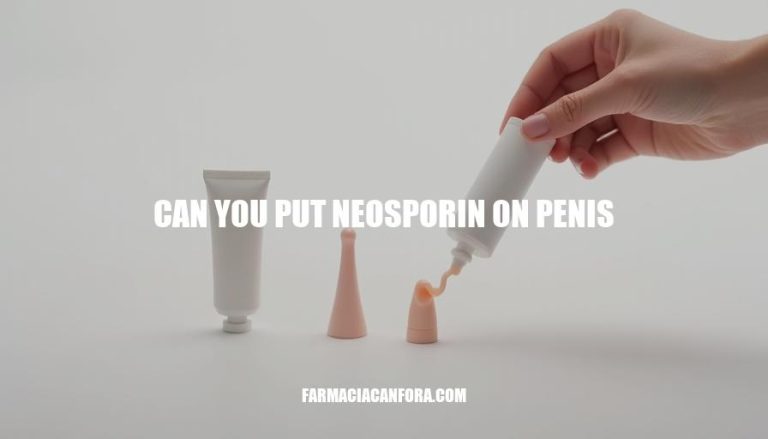


Neosporin is an antibiotic ointment that helps prevent infections in small cuts and scrapes. Some people use it on their penis for minor skin issues, but you should be careful. The skin on your penis is thin and sensitive, so Neosporin might irritate it.
It’s also not meant to be used on mucous membranes, which are found on the penis. Using Neosporin there can mess up the natural balance of your skin and make things worse. If you have a cut or scrape on your penis, talk to a doctor before putting any ointment on it.
They’ll tell you what to do to help it heal and stay safe.
It’s important to be cautious when applying any medication to sensitive areas like the penis. Here are detailed instructions on how to safely apply Neosporin if deemed appropriate:
Consult a Healthcare Professional: Before using Neosporin or any other medication on the penis, it’s crucial to consult a healthcare professional. They can determine if Neosporin is suitable for your specific condition and rule out any underlying issues.
Clean the Area: Wash the affected area gently with mild soap and warm water.
Pat it dry with a clean towel. Avoid using harsh soaps or scrubbing too hard, as this can cause further irritation.
Test for Allergies: Apply a small amount of Neosporin to a small area of skin on your arm or leg to check for any allergic reactions. Wait for 24 hours to see if there is any redness, itching, or swelling.
If you experience any adverse reactions, do not use Neosporin on the penis.
Apply Neosporin: If there are no allergic reactions, apply a thin layer of Neosporin to the affected area on the penis. Use a clean cotton swab or your fingertip (after washing your hands thoroughly) to spread the ointment evenly.
Avoid Sexual Activity: Refrain from sexual activity until the area is fully healed to prevent further irritation or infection.
Wear Clean, Loose-Fitting Underwear: Opt for clean, loose-fitting cotton underwear to allow the area to breathe and heal. Avoid tight-fitting clothing that can cause friction and irritation.
Monitor for Side Effects: Keep an eye out for any signs of infection, such as increased redness, swelling, pain, or pus.
If you notice any of these symptoms, stop using Neosporin and consult a healthcare professional immediately.
Follow Up: If the condition does not improve within a few days or worsens, seek medical advice. Persistent or severe infections may require prescription medication or other treatments.
Remember, it’s always best to seek professional medical advice before using any medication on sensitive areas. Your healthcare provider can provide personalized recommendations based on your specific situation.
While it’s technically possible to use Neosporin on minor skin issues on the penis, it’s essential to exercise caution due to the sensitive nature of the skin in that area.
It’s always best to err on the side of caution when it comes to sensitive areas like the penis. If you’re unsure about using Neosporin or have concerns about a specific skin issue, consult a healthcare professional for personalized guidance and reassurance. They can provide expert advice and help you determine the best course of treatment for your specific situation.